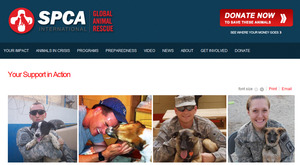Editor’s note: The Society for the Prevention of Cruelty to Animals (SPCA) is not to be confused with the American Society for the Prevention of Cruelty for Animals (ASPCA).

An animal welfare charity designed to raise funds to help animals in need all over the world is in fact spending most of the donated money to a direct-mail marketing company.
Though SPCA International managed to raise close to $27 million in donated funds, only a small fraction of that amount is actually going to help animals.
Though the charity managed to raise $14 million in 2010 alone, their tax records indicate that SPCA International only spent about $60,000 on grants to help U.S. animal shelters — less than 0.5 percent of the total amount of funds raised that year.
That same year, SPCA International paid out $8.4 million to Quadriga Art LLC and its partner company, Brickmill Marketing Services. Quadriga Art is currently at the center of a controversy involving two veterans charities, one of which — Disabled Veterans National Foundation — is currently under investigation by the U.S. Senate Finance Committee and may lose its tax-exempt status.
An anonymous spokeswoman for Quadriga Art LLC says that the efforts by SPCA International are part of an “aggressive strategy” that helps to build a large donor base, calling the charity’s methods “successful.”
“That resulted in an expected high cost in the beginning of their acquisition program,” the spokeswoman explains.
But according to Bob Ottenhoff, president of the charity watchdog group GuideStar, SPCA International’s fundraising strategy and their questionable tax records should not be ignored. Otenhoff says that the charity’s record raises “a number of red flags.”
“It’s not unusual for a nonprofit to fund-raise,” Otenhoff says. “In fact they need to fund-raise. But this organization has an enormous amount of fund-raising costs, certainly relative to the amount of money being spent.”
There is also indication SPCA International may have distorted the facts about one of their key programs, Operation Baghdad Pups, which the charity advertises as a way to “[help] U.S. troops safely transport home the companion animals they befriend in the war zone.”
Though the charity worked hard to advertise the Baghdad Pups program, only $450,000 — 3 percent of the funds raised by SPCA International in 2010 — went toward bringing back animals from Iraq and Afghanistan.
SPCA International Communications Director Stephanie Scott says 26 of the 500 animals transported to the U.S. as part of the Baghdad Pups program were service animals, and that none of those 26 rescued were U.S. Military Working Dogs but belonged instead to Reed Inc., a private road contractor working in Iraq and Afghanistan.
According to a spokesperson for Reed Inc., SPCA International spokeswoman Terri Crisp approached the contracting company after the contractor’s service dogs had already been placed in new homes in Kurdistan. The Reed Inc. spokesperson says that SPCA International insisted that the dogs be shipped back to the United States.
Crisp appeared on HLN in 2011 with two dogs she claimed were abandoned bomb-detection canines. “As the military pulls out and there’s not as great a need to have these dogs, there’s a surplus,” Crisp claimed. “These contractors don’t know what to do with them so these are the dogs that are falling through the cracks and they need homes desperately.”
But these dogs were the very same dogs Crisp pulled from Reed Inc., dogs that had already found homes in Kurdistan, says a Reed Inc. spokesman.
This isn’t the first time that Terri Crisp has come under fire for her fundraising techniques. In 2007, Crisp and Noah’s Wish, the animal rescue charity she led, were investigated by the California Attorney General for misrepresenting the charity’s Hurricane Katrina program when doubt arose as to whether the funds raised to place pets rescued from the massive 2005 hurricane were actually used for that purpose.
As a result of the settlement, Crisp was barred from serving “as an officer, director, or trustee, with any nonprofit organization for a period of five (5) years,” according to CNN. But last year, Crisp signed on as an officer and director for SPCA International.
SPCA International President and Founder Pierre Barnoti has been under scrutiny before, too. Barnoti was dismissed from his position as the Montreal SPCA’s president after the Canadian animal welfare charity was left in dire financial straits. Under Barnoti’s leadership, the charity owed a huge chunk of money to Quadriga Art LLC.
Current Montreal SPCA Executive Director Nicholas Gilman says that the charity is still paying off its debt to Quadriga Art today, and it still owes the direct-mail marketing company $2 million. Despite all of this, Barnoti is still fighting his dismissal from the Montreal SPCA.
Want to make sure your donation dollars are being used effectively? Charity Navigator is an independent nonprofit group that evaluates organizations based on financial reports and through its own investigations. You can search the website by specific nonprofits — even many local groups are listed — or by area of interest (for example, “animal welfare”).
DogTime recommends supporting the following domestic and international organizations, each of which receive the highest possible rating from Charity Navigator:





